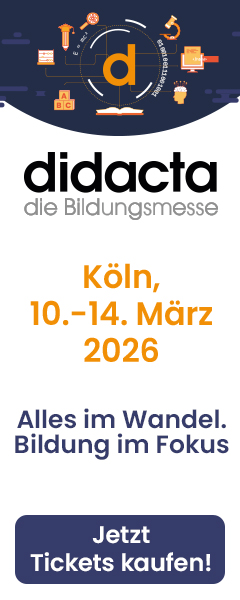Controlling the Data or Being Controlled by Data
 Zoetermeer (NL), November 2013 - Since January 2013 Erik Woning has been working in the Innovation Department of the non-profit organisation Kennisnet. Kennisnet is the Dutch public educational organisation whose task it is to ensure that educational institutions are aware and take advantage of the opportunities offered by ICTs. In his speech at ONLINE EDUCA BERLIN, he will ask, -œWhat questions, opportunities and concerns do teachers see when they think about establishing a more personalized and adaptive learning environment for their students?-
Zoetermeer (NL), November 2013 - Since January 2013 Erik Woning has been working in the Innovation Department of the non-profit organisation Kennisnet. Kennisnet is the Dutch public educational organisation whose task it is to ensure that educational institutions are aware and take advantage of the opportunities offered by ICTs. In his speech at ONLINE EDUCA BERLIN, he will ask, -œWhat questions, opportunities and concerns do teachers see when they think about establishing a more personalized and adaptive learning environment for their students?-
 Zoetermeer (NL), November 2013 - Since January 2013 Erik Woning has been working in the Innovation Department of the non-profit organisation Kennisnet. Kennisnet is the Dutch public educational organisation whose task it is to ensure that educational institutions are aware and take advantage of the opportunities offered by ICTs. In his speech at ONLINE EDUCA BERLIN, he will ask, "What questions, opportunities and concerns do teachers see when they think about establishing a more personalized and adaptive learning environment for their students?"
Zoetermeer (NL), November 2013 - Since January 2013 Erik Woning has been working in the Innovation Department of the non-profit organisation Kennisnet. Kennisnet is the Dutch public educational organisation whose task it is to ensure that educational institutions are aware and take advantage of the opportunities offered by ICTs. In his speech at ONLINE EDUCA BERLIN, he will ask, "What questions, opportunities and concerns do teachers see when they think about establishing a more personalized and adaptive learning environment for their students?"
In what way could the role of the teacher be affected by current developments in the area of data and analytics?
Erik Woning: Kennisnet is the public educational organization that supports and inspires Dutch primary, secondary, and vocational institutions in the effective use of ICTs. In the Kennisnet Innovation Department, we try to find solutions to relevant questions by conducting research and facilitating experiments in collaboration with educational practitioners.
In The Netherlands there are several initiatives that are trying to implement a personalized learning platform or adaptive learning content. These initiatives are in various states of development and have different focus areas and target audiences. However, what most have in common is that they are all driven by data created by student interaction with content. In this context, we see learning analytics as the effort to discover trends and patterns in educational (big) data with the goal of creating a more effective learning environment.
These trends and patterns can lead to actionable predictions or recommendations for teachers and students. Creating a data-driven education system might lead to more personalized learning, but also has many consequences for the way a school is organized and what role a teacher has.
What significance does the data gathered actually have?
Erik Woning: In one of our current research projects, we are trying to get teachers to think about questions like, “What does your ideal classroom look like?”; “What kind of learning takes place in such a classroom?”; and “What should your role as a teacher be?”. Using a semi-structured online discussion platform, dozens of teachers have participated in a lively discussion on the subject. For the purpose of this study, we have selected three specific initiatives for primary and secondary education. These three initiatives are good examples of platforms that use learning analytics principles to create a more personalized learning experience. Contrary to most other studies on learning analytics, this research is not about the technical, tooling side of this development, but focuses on the practitioner side of the story. TNS Nipo, a major research player in The Netherlands, has helped Kennisnet in the execution of this project.
How is it used?
Erik Woning: At Kennisnet we believe that data and analytics will play a huge role in the way schools and teaching will be organized in the future. We see that several educational publishers and distributers are moving away from their core business of creating and shipping books to becoming service providers and developers of learning platforms. One of our main concerns is that schools might end up with a platform or system that doesn’t fit their needs, but they have to put up with because of a data or vendor lock-in.
This is why the study Kennisnet is currently conducting has two goals. The first is to collect opinions and perceptions of teachers who are working with innovative learning platforms. The second is to create awareness among teachers and school leaders concerning the possibilities and challenges.
One of the strengths of Kennisnet is that we have a large network consisting of both schools and policy makers in which we can share our expertise and support schools. Throughout the school year, we will organize meetings for school managers and directors, IT coordinators, and teachers. During these meetings we will discuss trends in technology and education and try to inspire educators to make efficient use of the technologies out there.
What risks are teachers are exposed to through the use of learning analytics?
Erik Woning: Privacy issues are, off course, the main concern of schools that want to work with learning analytics tools and technologies. We try to inform schools to do the right thing and avoid unintended consequences of analytics such as privacy issues and reputation risk.
Five specific guidelines that schools need to be aware of are based in European laws on the protection of personal data. During my session at ONLINE EDUCA BERLIN, we will discuss these rules of thumb more specifically.










